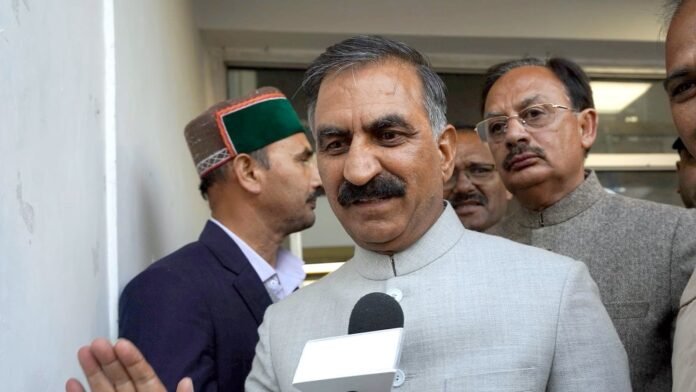In a dramatic escalation of political tensions in Himachal Pradesh, Chief Minister Jai Ram Thakur has accused the opposition Bharatiya Janata Party (BJP) of resorting to unconstitutional tactics in a bid to overthrow his government. The allegations come amidst a backdrop of simmering discontent within the ruling party and a series of high-profile defections that have rocked the state’s political landscape.
The political turmoil in Himachal Pradesh has been brewing for months, with dissent within the ruling Bharatiya Janata Party (BJP) coming to a head in recent weeks. Chief Minister Jai Ram Thakur, who has been facing mounting criticism from within his own party over issues ranging from governance to internal party affairs, has found himself increasingly isolated as factions vie for control of the state’s political machinery.
In a fiery address to the media, Thakur accused the BJP of resorting to unconstitutional means to engineer defections from the ruling coalition in a brazen attempt to topple his government. He alleged that the opposition party had been actively enticing legislators from the ruling alliance with promises of ministerial berths and other inducements, in clear violation of democratic norms and ethical principles.
Thakur’s accusations have reignited the debate over the ethical boundaries of political maneuvering and the sanctity of democratic institutions in India’s vibrant political landscape. The allegations of horse-trading and subversion of the democratic process strike at the heart of the principles of representative governance, raising concerns about the erosion of democratic norms and the abuse of power for political gain.
The Chief Minister’s decision to go public with his accusations reflects the gravity of the situation and the growing sense of urgency within the ruling coalition to fend off the threat of a potential power grab by the opposition. Thakur’s willingness to confront the BJP head-on underscores his determination to defend the mandate entrusted to him by the people of Himachal Pradesh and to uphold the integrity of the democratic process.
The timing of Thakur’s allegations is significant, coming at a time when the state is grappling with a host of pressing challenges, including the COVID-19 pandemic, economic uncertainty, and social unrest. The Chief Minister’s decision to confront the opposition head-on signals his readiness to confront the political storm brewing on the horizon and to assert his authority in the face of mounting opposition.
For the BJP, the accusations leveled by Chief Minister Thakur represent a serious challenge to its credibility and reputation as a champion of democratic values and ethical governance. The party’s leaders have vehemently denied the allegations, dismissing them as baseless and politically motivated. However, the mere fact that such allegations have been made underscores the deep divisions within the ruling party and the intense power struggles playing out behind the scenes.
The unfolding political drama in Himachal Pradesh has broader implications for the state’s political landscape and the future trajectory of its governance. The allegations of unconstitutional tactics and horse-trading threaten to undermine public trust in the democratic process and cast a shadow over the legitimacy of the state’s elected representatives.
In the midst of the turmoil, it is imperative for all stakeholders to uphold the principles of democracy, transparency, and accountability and to respect the will of the people as expressed through the electoral process. The integrity of India’s democratic institutions depends on the ability of its leaders to rise above partisan interests and to govern with fairness, integrity, and a commitment to the common good.
As the political standoff in Himachal Pradesh continues to unfold, the eyes of the nation will be closely watching to see how the situation evolves and whether a resolution can be reached that respects the principles of democratic governance and safeguards the interests of the people. In a democracy, the will of the people must always prevail, and it is incumbent upon the state’s leaders to ensure that their voices are heard and their rights protected. Anything less would represent a betrayal of the trust placed in them by the citizens of Himachal Pradesh and a grave disservice to the ideals of democracy.

